Tag: election
The Elephant in the Room: Americans Have Spoken
by Christina Charie '25 on December 3, 2022
Opinion Editor
Opinion
The 2022 Midterm Election “Red Wave” is now a symbol of false hope for the Republican Party and former president Trump. Politicians on the right confidently proclaimed that November 8, 2022 would prove that Americans are frustrated with Democratic leadership. Inflationary pressures and attacks on gun rights could not save them from doom. Even though Republicans claimed some victories, given recent historical trends for midterms elections, the 2022 elections are largely a failure for the party.
Despite competitive races in Pennsylvania, Georgia, Nevada, and Arizona, Democrats have retained control of the Senate with the Warnock-Walker race still undecided. Republicans did gain control of the House, but only by a two-seat margin, with two races still uncalled. Even if Republicans win both races, a four-seat majority is nothing to celebrate.
Historical data from Franklin Roosevelt to Donald Trump demonstrates that lower presidential approval ratings mean that his (or her) party will lose more House seats during the midterms. During President Obama’s administration, Democrats lost sixty-three House seats in 2010, for instance, even though the president’s approval rating was polled at 45%. The Democrats also lost Senate seats during both Obama-era midterm elections. Retaining control of the Senate is a major victory for Democrats. Even though President Biden’s approval rating was 41.4% on Election Day, Democrats only lost nine House seats during this election cycle, creating an unprecedented situation.
Reflecting on the 2018 midterm election results also demonstrates that the Democrats can consider the 2022 election cycle a success. Trump’s 2018 approval rating was polled around 44%, which predicted that Republicans would lose 33 seats in 2018. The Republicans lost forty House seats during the 2018 cycle. The Democrats should have lost control of the House by a significant margin, which demonstrates that the Republicans have no one to blame but themselves.
Whether Democrat or Republican, one must acknowledge that extreme right-wing decisions from the Supreme Court paired with the rise of Trumpism are not necessarily popular among the American public. President Biden is not the most popular president. Democrats are not necessarily saints. For many, they might be the lesser of two evils.
If Republicans want to retain their influence, policy initiatives must reflect the will of the people. With yet another recent mass shooting in Colorado, the NRA is becoming a liability for the party. Republicans should not suggest a potential nationwide abortion ban given that it is highly unpopular. Ultimately, actions that ignore public sentiment could signal the Republicans’ demise.
However, the former president presents perhaps the largest challenge for Republicans to overcome. Even though some Americans continue to support former President Trump, there are many Republican voters who are quite frustrated with his actions pertaining to January 6, 2021. Without a meaningful bipartisan commitment to a full investigation of the President’s response to the Capitol riot, the Republican Party will continue to lose influence in American politics.
A Recap of the 2022 Midterm Elections
by Liam Dunne '26 on November 27, 2022
News Co-Editor
Featured Slider
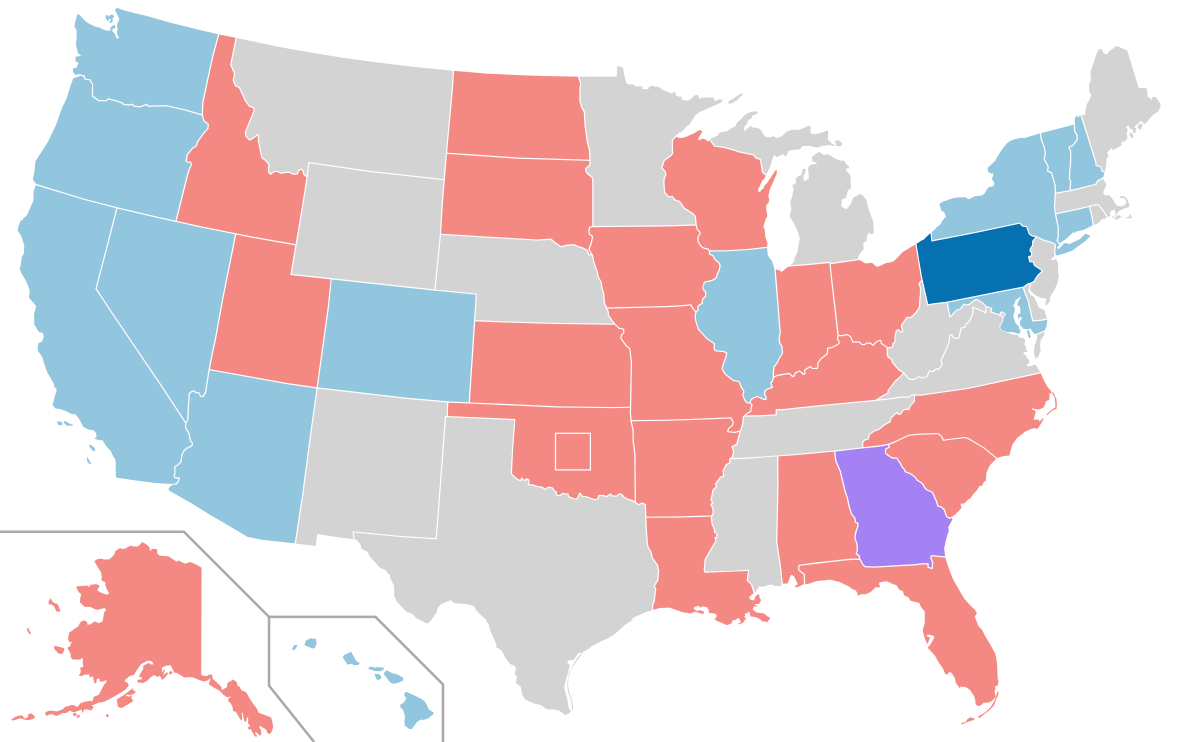
In early November, Democrats were projected as likely to lose the majority in both the House of Representatives and the Senate; polling and analyst opinion predicted a “red wave” in the midterm elections. As results continue to roll in, Democrats have clinched the Senate majority, holding 50 seats plus the tie-breaking vote of Vice President Kamala Harris, while the race for control of the House remains neck and neck. Progressives have defied popular expectations in this election, revealing the attitudes of America’s voter demographic.
Why exactly were these results so skewed from polling expectations? An unprecedented turnout among young voters is one answer. Some analysts say that this election had the second-highest young voter turnout in the past 30 years. In recent elections, young voters have been largely left-leaning; in this election, 63 percent of voters between the ages of 20-29 voted Democrat in the race for the House while 35 percent voted Republican. In key battleground states such as Pennsylvania, young voters resoundingly showed up for progressive candidates. 70 percent of voters aged 20-29 cast their ballots for the Democratic candidate John Fetterman in the Pennsylvanian senatorial race. Pennsylvania was the only Senate seat to flip in this midterm election, helping Democrats to clinch the Senate majority.
A number of topical issues appeared on state-level ballots this election, with proposed revisions concerning abortion, criminal, and worker rights. Abortion rights were added to local constitutions in California, Michigan, and Vermont, while bans were rejected in both Kentucky and Montana. A dynamic has become apparent in predominantly conservative states regarding abortion bans: in the wake of Roe v. Wade being overturned, many Republican voters are fighting to preserve reproductive rights despite the resounding interests of their representatives. For example, in Michigan, the majority of right-leaning districts in the gubernatorial race voted to preserve abortion rights.
In several states, the issue of slavery was put to a vote. Voters in Alabama, Vermont, Tennessee, and Oregon repealed forced servitude as punishment for a crime from their state constitutions, closing a loophole enshrined within the 13th Amendment that forces convicts into slave labor as part of their sentence. Louisiana voted to keep this loophole within its state constitution. Workers’ rights have been established in several states: Nebraska and Washington, D.C. voters secured minimum wage increases while Illinois enshrined collective bargaining rights into its constitution, guaranteeing union rights for its labor force. Locally, the state of Rhode Island chose Democrats across the board. Secretary of State, both House seats, Governor, Lieutenant Governor, and Attorney General all went to Democratic candidates. Regardless of political affiliation, progressive policies were popular in many states in this election.
With progressive policy on the rise among many voting demographics and a resoundingly liberal young voter generation, many Americans wonder what is keeping Democrats from additionally securing the House of Representatives. Some political experts believe the answer lies in voter suppression. In February, the Supreme Court voted 5-4 to suspend a ban on racial gerrymandering for the 2022 midterm elections. While the race for the Senate is decided by state-wide popular vote, House representatives are decided by district. Racial gerrymandering is the process of drawing district lines that pour minorities (an overwhelmingly left-leaning voter demographic) into a singular district, thus ensuring that they have less representation. Georgia exemplifies this dynamic—although the state voted for Raphael Warnock, a Democrat, in the senatorial race, only five of their 14 congressional seats went to Democrats in the race for the House. Democrats do still have a chance of retaining their congressional majority; voters nationwide have demonstrated approval of a more Democratic government. This election depicted a largely left-leaning young voter demographic and significant support for Democratic policy.
An Open Letter to President Biden
by David Salzillo Jr. '24 on November 17, 2022
Opinion Staff
Editorials
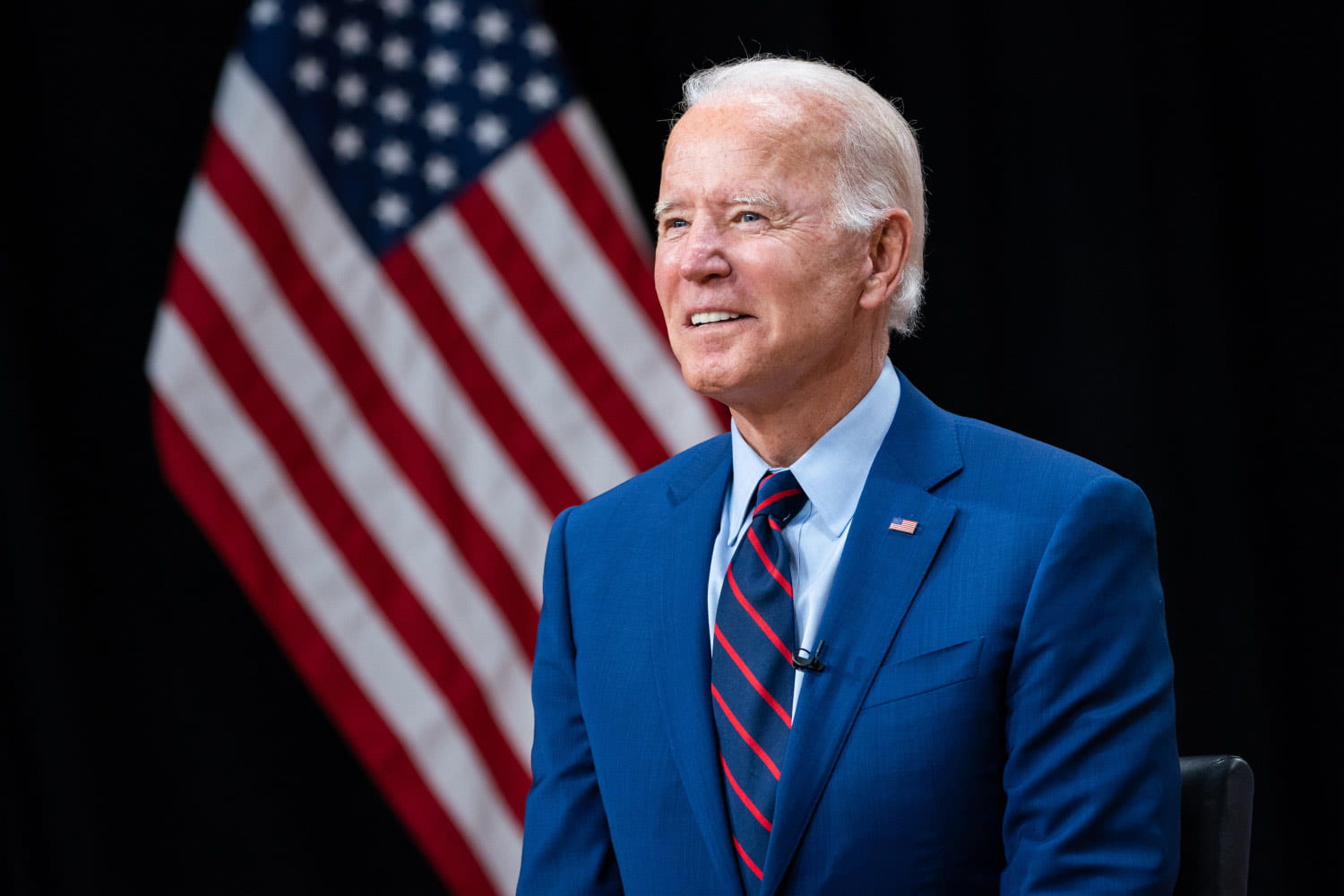
Dear President Biden,
Congratulations. As I am writing this, your party has managed to hold the Senate, and still—as of Nov. 14—has a fighting chance of holding the House. Your instincts have proven correct: above and beyond political disagreements and the public’s view of your presidency, the majority of voters expressed their desire to prevent government by the people, of the people, and for the people from “perishing from the earth.” Yes, it was a close call, and too close for me to be content with. However, the majority did speak with a resounding voice, bringing a decisive defeat to election deniers and other anti-democratic rhetoric within the Republican Party. For now, the threat of authoritarianism in America has stayed.
I, for one, give you your proper credit. When others in the party did not, you had faith in the working people across this country making the right choice. And when Democratic pundits fell into hysterics about “red waves,” you kept calm. But now we have won. And, like Robert Redford in The Candidate, we must ask this question: “What do we do now?” The battle is not over, and the stakes are higher than ever.
We see the rise of “new and improved” Trumpian and anti-democratic politicians like Ron DeSantis. We see one of our two major political parties still consumed by election denialism and political primaries that reward these election deniers. Worst of all, we see that the Republican Party establishment is, as it stands now, far too morally bankrupt to repudiate Trumpism once and for all. Even if Republican Party leaders cast Trump aside, they will only cast him aside because he “didn’t work” like they wanted him to—like a child throwing away a dysfunctional toy.
Our politics cannot survive like this for much longer. One might say the Republican Party will implode if it continues on this path. On the other hand, it might not. It might instead take us on more of a “winding road” toward authoritarianism. We cannot take the chance.
You want to be a great president. What’s more, you need to be a great president for our republic to survive. To overcome such fundamental threats to our democracy, nothing less than a great transformation of American society is necessary. And when the problem is our politics and, more to the point, our politicians, then a top-down transformation appears even more appropriate. Consider the example of history too. Each time we have had a “crisis of confidence” in our democracy—whether during the Civil War or the Great Depression—a great President has led us closer to the Promised Land.
Like Thomas Paine once said of the American Revolution, “we have it in our power to begin the world over again.” But that requires an ambitious agenda, on par with Johnson’s Great Society and FDR’s New Deal. Of course, I can hear your advisers saying, “But we have done that. Haven’t you heard about our historic investments in infrastructure? And what about our historic initiative to get Medicare to negotiate prescription drug prices?” I respond simply: the infrastructure investments, historic as they are, are like pouring a bucket of water onto a California wildfire. Likewise, Congress passing a bill allowing Medicare to negotiate prescription drug prices, while appreciated, was long overdue.
What I am saying is go bigger. Think bigger. President Johnson could have made historic progress on civil rights without passing the Civil Rights Act of 1964 and the Voting Rights Act of 1965. Why? Because other presidents had not been able to do much of anything on that front. And President Johnson could have made historic investments in combating poverty without the Great Society. All he had to do was invest $1 more than Kennedy or Roosevelt had. But that is not what he did. History rightly celebrates Johnson for his vision. Without that type of thinking, would anybody have the chance to enjoy the benefits of Medicare and Medicaid?
Nonetheless, I realize you face certain practical limitations. By all means, acknowledge them. For my part, I will be brutally honest: this is going to be hard, and it at times will seem impossible. It will take some masterful politicking, just as it did in Johnson’s time. Even then, advancing a bold legislative agenda is no less impossible than it was to get the Civil Rights Bill through a Senate with segregationists and the filibuster.
I am confident the American people will follow a good vision, with results that positively affect their everyday lives. Voters may not be able to fact-check as well as they could, but they can read “the signs of the times.” If your Administration passes the bills, your Administration will reap the rewards.
It’s getting there that’s the problem. You have a possible Republican House, you have at least 50 Democratic Senators, and you have Senators Joe Manchin and Kyrsten Sinema. What could you possibly do with that?
It may look like you got the wrong deck of cards for a great presidency. Nevertheless, there is still some hope. But not in conventional compromising. Those days are over, for better or worse. I propose to you, as St. Paul did to the Corinthians, a “better way.” Consider again Johnson’s Civil Rights Bill. As Jonathan Rauch notes in “How American Politics Went Insane,” getting that bill passed meant getting it past House Republican leader Charles Halleck of Indiana. How? Was it through a passionate debate of the issues or principled arguments for the equality of all people? No. A NASA research grant for Halleck’s district was enough to do the job. This approach to politics might make one cynical, but not me. Instead, it shows how even political self-interest can lead to monumental change.
I will add this: per the old cliché, “nothing succeeds like success.” Republicans will not compromise on their own; the people must force them to take their places at the negotiating table. If your Administration can pass more and more ambitious legislation—even if by one vote—and people start to like what you are doing, then Republicans will have to compromise. Self-interest and self-preservation will drag them along. As Martin Luther King Jr. said, “A genuine leader is not a searcher of consensus but a molder of consensus.” President Johnson likely would have agreed. Compromise, indeed, is not exactly the right word to describe how Johnson passed the Civil Rights bills; arm-twisting is perhaps the more accurate term. Johnson used every method of persuasion he had to get his party and those in the other party onboard.
Obviously, you might not want to imitate everything Johnson did. But a little more arm-twisting may do some good, especially if Democrats gain a seat in the Senate and especially if somehow Democrats hold the House. Arm-twisting, aggressive public relations efforts, and some good old-fashioned backroom negotiations. They have never failed the traditional politician, and it may be fatal to go back to the “let’s split everything down the middle” model of compromise. Instead of splitting things down the middle (after all, what is the middle now? The halfway point between you and Marjorie Taylor Greene?), we must push the middle over.
Thomas Paine once said, “we have it in our power to begin the world over again.” And if we do not take advantage of that power, then others will. And we may not like the world they give us.
Rhode Island’s 2nd Congressional District Election: Seth Magaziner vs. Allan Fung
by Sarah McLaughlin '23 on October 29, 2022
Editor-in-Chief
National and Global News
by Sarah McLaughlin ’23
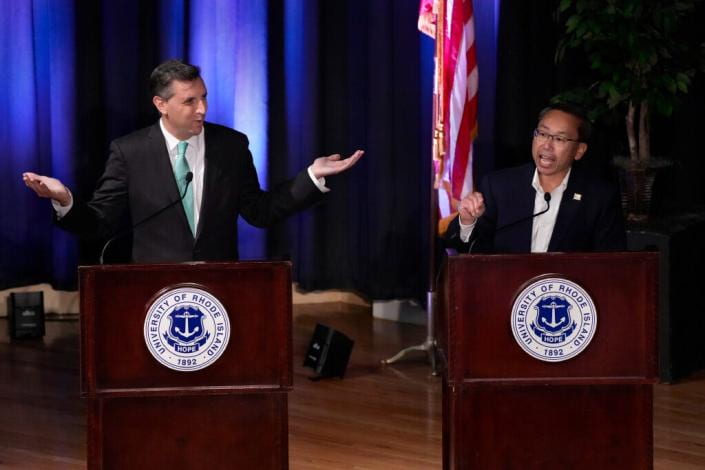
With Congressman Jim Langevin not seeking re-election, the Rhode Island 2nd Congressional District seat is up for grabs this election season. The Providence College campus, as well as the surrounding off-campus neighborhood, is a part of this district, which spans from western Providence to the northwestern, southwestern, and southeastern reaches of the state.
Democrat Seth Magaziner and Republican Allan Fung are the two leading opponents for the seat. Magaziner is the current Rhode Island General Treasurer, has a teaching background, and is a graduate of both Brown University and Yale University. Fung has served as the current mayor of Cranston since 2008, has a law background, and is a graduate of Rhode Island College and Suffolk University Law School. Both candidates have previously run for governor and were unsuccessful. Magaziner originally began this year’s election season with a bid for governor, announcing his candidacy in September 2021. In January, he changed course for Congress.
Magaziner states that he “is running for Congress to fight for the middle class and those working hard to join it.” He pledges to protect Social Security and the Affordable Care Act (Obamacare), lower the price of prescription drugs, and lower gas prices by returning the profits of big oil companies to consumers. He has stated he supports suspending the federal gas tax. Magaziner is pro-choice; he helped pass the Reproductive Privacy Act, which codified Roe v. Wade into Rhode Island state law. He has also initiated clean energy programs as the state’s treasurer. Magaziner has received the endorsement of current Congressman Langevin.
Fung also pledges that he will lower the cost of living and gas prices. He argues that the U.S. should not be dependent on imported oil and that we should instead increase domestic oil production. He has stated that he is in favor of completing undrilled oil wells. Fung also states that concerning energy, he is “laser-focused on bringing new approaches…to the table that protect working families’ paychecks while also preserving our environment for years to come.” He believes that renewable energy brings an opportunity to create jobs in Rhode Island, stating, “Let’s take the debate over climate solutions out of the political arena and put [it] into the paycheck arena.” On the issue of abortion, Fung’s views are unclear. In 2018, he said he supported “a woman’s right to make medical decisions,” with some restrictions. If he wins, Fung would be the first nonwhite representative of Rhode Island in Congress.
The two candidates went head-to-head in two debates this week. The first debate took place on Monday, Oct. 17 at the URI Kingston campus. It also featured independent candidate Bill Gilbert, who is currently polling at about 5 percent.
Among other topics discussed were the events of January 6, 2021. “January 6 was a very dark day in our country’s history, and I spoke out on that day,” Fung stated, likely in an attempt to differentiate himself from the Republicans who supported the events. “I’m not President Trump,” he said. “I don’t act that way. I’m not about divisiveness.” However, Magaziner pointed out that Fung has “made clear” that he would vote to “put election deniers in charge of the House,” citing his support of Kevin McCarthy and Jim Jordan. Fung argued that Magaziner’s support of Nancy Pelosi is a larger issue, believing that her actions have “crippled the economy.”
I spoke with Dr. Cammarano of the PC Political Science Department about his thoughts on the debate. “This is a year where both sides are trying to say they’re not like the typical person in their party,” he said. “The reality is they’re both going to vote with their party.”
Magaziner also spoke on how he supports lowering interest rates for student loans so students can focus on pursuing their desired careers after graduation. Fung agreed that he would support lowering the interest rates, and he also stated he would support “doubling the amount of Pell grants” awarded.
On the topic of abortion, Magaziner stated, “There’s no ambiguity about where I am.” He argued that Fung, on the other hand, has gone back and forth on the issue. Fung pushed back, stating that he has made clear his opposition to a national abortion ban.
Independent candidate Bill Gilbert, who has thus far run a very low-profile campaign, spoke on how he believes “hyperpartisanship” is a major issue dividing the country. “We’re still running against Trump, and he’s not in office,” he stated. “We need to heal.” He also argued in favor of public funding for STEM fields and vocational training.
The second debate took place on Tuesday, Oct. 18 at Providence Performing Arts Center. Issues on which the two candidates agreed include federal legalization of marijuana, federal protection of same-sex marriage, and instituting term limits for both Supreme Court justies and congresspeople.
According to Suffolk University and Boston Globe polling data from Oct. 12, Fung leads Magaziner 45 percent to 37 percent. 13 percent of voters remain undecided. David Paleologos, director of the Suffolk University Political Research Center, stated, “Fung has a lead in this race due to overwhelming support from men, independents, and older voters.” Meanwhile, Rhode Island Governor Dan McKee, a Democrat, leads Republican challenger Ashley Kalus 46 percent to 36 percent. Paleologos believes independent voters are responsible in both cases. Fung and McKee both have a hold over independents.
Polling data from Fleming & Associates gives Fung a 6-point lead, while data from the Mellman Group gives Fung a 3-point lead. Despite the polling data it cites, FiveThirtyEight still judges the race in favor of Magaziner; the analysts give him a 55 percent chance of winning as of Oct. 17. However, as Dr. Cammarano pointed out, the margin of error is about 6 points. “We just don’t know what’s going on,” he said. “I would still say Magaziner has an edge, but he has a certain vulnerability.” Dr. Cammarano noted how while Magaziner only recently moved to his district, Fung has lived in and governed Cranston for years.
While Inside Elections with Nathan L. Gonzales and Larry J. Sabato’s Crystal Ball categorize the race as one that leans democratic, The Cook Political Report rates it as a toss-up. This seat could be up for grabs for either candidate. The House could potentially swing in favor of the Republicans depending on how many of these toss-up seats they win.
Rhode Island is generally thought of as a deep blue state, but the more rural parts of this district have the potential to vote red. “If water is touching a town, it tends to be Democratic,” Dr. Cammarano stated. Biden won all five counties in the 2020 election, as did Democratic Senator John Reed. However, while Biden saw large margins of victory in the coastal cities like Providence, Warwick, Newport, and Narragansett, he lost many of the inland towns, such as Burrillville, Glocester, Scituate, and Foster, all of which are a part of the state’s 2nd Congressional District. Thus, the race could truly go either way.
If you are registered to vote in Rhode Island, remember that your vote counts. Election Day is Tuesday, November 8, and the polls will be open from 7 a.m. to 8 p.m.
From Scranton, PA to Pennsylvania Avenue: Biden, Harris Enjoy Historic Victory
by The Cowl Editor on November 12, 2020
National and Global News

by Eileen Cooney ’23
News Staff
On Saturday, Nov. 7, after four long days of counting votes from key swing states including Arizona, Georgia, Nevada, North Carolina, and Pennsylvania, presidential candidate Joseph Biden obtained 290 electoral votes, surpassing the 270 threshold needed to take the White House.
Early Friday morning, Joe Biden took the lead in Pennsylvania, a very promising sign for the Biden campaign, as Biden sought to turn the state blue after Hillary Clinton failed to do so in the 2016 presidential election. With Biden winning Pennsylvania and leading in Georgia, President Donald Trump’s hopes at reelection were squashed—without Georgia or Pennsylvania, he could not gain enough electoral votes to win reelection.
In a speech given on Thursday, Nov. 5, President Trump indicated his intentions to preserve the integrity of the election by bringing the results to the courts, saying there would be “a tremendous amount of litigation,” and that he would not “allow anyone the ability to steal such an important election.” He also urged officials to stop counting votes, tweeting “STOP THE COUNT!”
On Nov. 6, Supreme Court Justice Samuel Alito temporarily granted a GOP request to have mail-in ballots received after Nov. 3 in Pennsylvania separated, but he did not prohibit them from being counted.
Many prominent Republican Senators publicly defended President Trump’s claims of election corruption. Senator Lindsey Graham, chair of the Senate Judiciary Committee, was one of many who said that he stands with President Trump. Similarly, Senator Ted Cruz has also affirmed his support for President Trump, voicing his opinion that the Justice Department, state legislatures, and the Supreme Court should get involved to make sure that voting laws have been followed properly. Others, notably Senate Majority Leader Mitch McConnell, have remained largely mute on the subject, with McConnell only tweeting, “Every legal vote should be counted.”
While it was largely expected that a winner would not be determined on election night due to the COVID-19 pandemic and the surge in absentee voting, Democratic leaders and the Biden campaign were not expecting President Trump to declare victory prematurely.
On election night, Trump gave what seemed to be a victory speech, where he claimed victory in Georgia and North Carolina, even though ballots were still being counted. He also contested the results in Arizona, calling upon officials to overturn their decision to give Biden those electoral college votes at the time.
In the days following election night and the pronouncement of Joe Biden as the winner, President Trump has vehemently attacked the integrity of the election, claiming that “if you count the legal votes, I easily win,” and calling mail-in voting “a corrupt system.” He has accused Democrats of trying to steal the election from him, claiming that the voting apparatus of those states key swing “are run in all cases by Democrats.”
This statement is false, as in the key states of Georgia and Nevada, the top elections officials, Secretary Brad Raffensperger and Secretary of State Barbara Cegavske, respectively, are both Republicans. Again, President Trump and his campaign team have publicly announced their intentions to pursue legal action to ensure that all election laws were followed.
Meanwhile, the Biden campaign remains confident in the results of the election, with Joe Biden giving a victory speech that focused on his administration’s next steps and attempted to bridge the divide between Biden and Trump supporters. Biden said, “For all those of you who voted for President Trump, I understand the disappointment tonight. I’ve lost a couple of times myself. But now, let’s give each other a chance.”
Biden also announced on social media, “I am humbled by the trust and confidence you have placed in Kamala Harris and I. We’re reminded tonight of all those who fought so hard for so many years to make this happen. It is long overdue, but once again, America has bent the arc of the moral universe towards justice.” This election will certainly be one for the history books, as Mr. Biden received the most votes ever cast for a U.S. president and Ms. Harris became the first woman, first Black American, and first South Asian American to be elected to the office of vice president.
Listomania: Things that are better to watch than the presidential debate
by The Cowl Editor on October 15, 2020
Features
Paint drying
Your life flashing before your eyes
“As Seen On TV” ads
Seventh-graders fighting on the playground during recess
ASPCA commercials
DVD bouncing loading screen
A turtle crossing the road
PC COVID-19 cases dashboard
Thursday Night Football
PC basketball losing to URI
Zoom class recordings
Your parents being intimate
The elderly texting with their index fingers
Your professor struggling to share their screen on Zoom
Green Book
Bursting the PC Bubble: New Israeli Prime Minister Elected
by The Cowl Editor on March 5, 2020
National and Global News

by Addison Wakelin ’22
News Staff
After a continuous year-long political deadlock, the long-term Israeli Prime Minister Benjamin Netanyahu has claimed a victory from preliminary results and exit polls. This was a major win for his party’s attempt to try and secure its majority in the Knesset, Israel’s parliament. This win is also significant for PM Netanyahu’s party over contentious rival Benny Gantz and his centrist Blue and White party.
This had been Israel’s third election in less than one year, with elections last April and September, due to both of the main party leaders unable to win the majority in the nation’s parliament system the last two election cycles.
Recently, Israeli media has reported that 93 percent of votes have been counted.
The most recent exit polls state that Netanyahu’s Likud party was projected to win 36 to 37 seats, whereas Gantz’s Blue and White party was projected to win 32 to 34 seats. It has been projected that his Likud party, along with its right-wing allies, are forecasted to win 59 seats, although this would leave the party two short of a majority.
Last week, Netanyahu spoke in Tel Aviv about the election. He stated, “Our opponents said, ‘the Netanyahu era is over.’ But together we flipped the story. We turned lemons to lemonade. We must avoid any more elections. It’s time to heal the rifts. It’s time for reconciliation.”
Gantz also spoke in Tel Aviv to his supporters in response to the exit polls. Gantz stated, “Perhaps this is not the result you are wishing for…but let’s look at the glass half full.” Gantz remains optimistic that there is a possibility that his own coalition, which identifies as both centrist and centrist-left, may have a chance to win the parliamentary majority needed to form a government.
Throughout this past election, Gantz has targeted not only Netanyahu’s corruption charges, but also the general fatigue that Gantz cites as a major problem in Netanyahu’s ability to properly lead Israel.
Netanyahu is hoping to seek a fourth consecutive term in office (his fifth overall) as he tries to grasp onto power, while simultaneously battling significant corruption charges.
Over the last three years, PM Netanyahu has been under an ongoing investigation by Israeli prosecutors into corruption charges; those charges include breach of trust, bribery, and fraud. Further, he is being prosecuted for the acceptance of gifts from wealthy friends along with meeting with major media figures to negotiate positive media coverage of himself.
Netanyahu has continuously denied any wrongdoing relating to these charges and will not step down, as he believes he can still proudly lead Israel while also dealing with court matters.
Despite these ongoing corruption charges, Netanyahu continues to present himself as the most viable Israeli leader. He further stated in that same Tel Aviv rally, “This is a victory against all the odds, because we stood against powerful forces.”
Netanyahu has repeatedly suggested that the fate of Israel’s political institution will be revitalized through his party’s ability to become the parliamentary majority.
However, the future of Israel’s parliamentary majority, along with Israel’s own political fate, both remain largely contested in reviving its paralyzing, lengthy deadlock. It remains uncertain if another election for parliamentary majority will occur, or if the two parties will have to compromise to reach an agreement to reestablish a coherent Israeli government.
Around the Political Horn: PC Professors Weigh in on Current Political Events
by The Cowl Editor on February 13, 2020
Campus
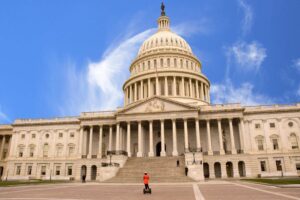
by Nicole Silverio ’22
News Staff
Last Wednesday, February 5, five professors from the political science department, Dr. Bill Hudson, Dr. Joseph Cammarano, Dr. Paul Herron, Dr. Adam Myers, and Dr. Matthew Guardino, held a panel discussion in the Arthur F. and Patricia Ryan School of Business discussing contemporary politics in the past week.
This week has shaped American politics with the start of the Democratic primary and caucus elections, the presidential impeachment trial, and the State of the Union Address, which took place the night before the panel.
The first topics of discussion were the articles of impeachment, in which President Donald Trump was officially acquitted by the Senate. Only one Republican senator, Mitt Romney, voted to convict President Trump.
Dr. Hudson made the claim that Trump was not cooperating with Congress. He then cited a book published in the 1970s titled The Imperial Presidency which discussed the impeachment of former President Richard Nixon. Nixon allowed witnesses to testify in his trial, unlike the current president.
“Trump has not been forthcoming in providing information. This administration would not participate in the impeachment at all. Nine witnesses called to testify refused to appear,” said Hudson. “There’s going to be more stonewalling from the Trump administration which may depend on court cases that may come up.”
After the discussion on impeachment, a long discussion arose on the State of the Union Address, in which President Trump spoke before Congress, Supreme Court justices, and the American people, addressing the progress made in this country.
Dr. Myers stated that historically, “The State of the Union Address was not public until Woodrow Wilson’s presidency. The reasoning for this was the fear of demagoguery. Meyers says, “We should go back to the way it was in the 19th century, where the President submitted a letter to his Cabinet and Congress. The current State of the Union is a ridiculous tradition.”
Dr. Cammarano added, “We have to acknowledge that Trump has done a lot of what he said he would do in 2016. However, I have been studying politics for several years and this State of the Union made me not want to study politics anymore since it was a classic example of what politics has become. It has become political professional wrestling. What we’re seeing is not politics, it’s political wrestling.”
What he was referring to was the tension between President Trump and Speaker Nancy Pelosi, who visibly tore Trump’s speech on camera. After, Trump refused to shake her hand.
In regards to Trump’s claims in the State of the Union, Dr. Guardino said, “Last night was an object lesson not only to fact check but to critically evaluate claims in context. The economy is doing well largely due to many grassroot movements, which has led to states across the nation increasing their minimum wages, which the Trump administration has opposed doing.” President Trump’s accomplishments may have been embellished or have happened without his involvement.
Dr. Hudson mentioned that Trump is “a very clever showman and administered that in the State of the Union. It’s in Trump’s best interest to be the kind of showman that he is when he talks to the press in order to get reelected.”
On the topic of the recent conflicts between political parties, the professors talked about how fifty years ago, political parties were weaker, causing differences in opinions to have less of an impact on legislation.
“Up until the 70s, we did not have strong political parties,” said Myers. “When we have strong parties like we do today the system breaks down.” Cammarano added, “I want weaker parties and for Republicans and Democrats to focus on the common interest of the people.” In today’s political climate, it is difficult for people with different political views to understand others opinions, which reflects how the parties treat one another in Congress.
In today’s polarizing political climate, the political science department wants students to understand what is currently unfolding in politics because, as Cammarano put it, “the young people are going to be the ones to have to fix the major issues in today’s politics, and it is essential to get today’s youth involved in political events in order to make significant changes needed in today’s crazy political climate.”
Election of 2020: Current Standings for Candidates
by The Cowl Editor on January 16, 2020
National and Global News
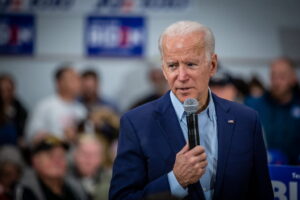
by Alexandra Huzyk ’20
News Staff
The next United States presidential elections are scheduled to take place on Nov. 3, prompting voters to consider a number of diverse candidates. As of January 2020, there are 12 major Democratic candidates, and three major Republican candidates, including incumbent President Donald Trump.
The eighth, ninth, and tenth Democratic primary debates are scheduled to take place throughout February. These debates help to inform voters, promote accountability of elected officials, and progressively narrow down the number of candidates running for the Democratic nomination. Past debates have pressed candidates to address important issues like healthcare, education, gun violence, inequality, and war. The Democratic primary will likely be settled on Super Tuesday—March 3, 2020—“when the largest number of states and territories hold a presidential preference primary or caucus.”
Front-runners for the Democratic nomination currently include Joe Biden, Bernie Sanders, Pete Buttigieg, Elizabeth Warren, and Amy Klobuchar. Many predict Biden will be the nominee for the Democratic Party; having maintained consistently strong African-American support, continuing to receive a multitude of endorsements, and polling the best against President Trump. According to political Analyst Nate Silver, “Should Joe Biden win Iowa, he has an 80 percent chance of becoming the nominee.”
In the wake of these predictions, Sanders has gained momentum within the past months, receiving $34.5 million in the last fundraising quarter and garnering strong support from younger generations and public sector union members. However, Sanders’ democratic socialist views pose an issue for Democrats who think a more politically moderate candidate has a greater chance of winning against President Trump. In addition, many view Sanders’ age (77) and health as potentially problematic.
In the opposing party, candidates who seek to attain the Republican nomination include incumbent President Donald Trump, Joe Walsh, and William F. Weld. Even after having been recently impeached, for abuse of power and obstruction of Congress, President Donald Trump remains the primary Republican presidential candidate. The chances of either Walsh or Weld being granted this nomination are extremely low.
Although presidential approval ratings of Trump have remained notoriously low throughout his time in office, it is reported that he has around a 40% chance of being reelected to office. These chances of reelection may be explained by the decreasing unemployment rate and increasing GDP growth rates, which some attribute to the work of Trump’s presidency.
Historically, 17 of 44 presidents have been reelected for a second term. On the power of incumbency, Aaron David Miller, an academic at the Carnegie Endowment for International Peace, has said, “As President Trump has demonstrated with frightening clarity, presidents dominate the national and media narratives; we see or hear them daily, in Trump’s case often hourly.”
A number of different factors will continue to influence the likelihood of Trump’s reelection, including the upcoming impeachment trial in the Senate and the recently initiated military conflict with Iran.
Passing the Torch: Rev. Kenneth Sicard Named New President of Providence College
by The Cowl Editor on October 10, 2019
Campus

by Hannah Langley ’21
News Co-Editor
In 1919, Providence College opened its doors under the leadership and guidance of its first president, Reverend Dennis Albert Casey, O.P. Since then, the College has grown tremendously under the work and presidency of 11 other Friars, including its current president, Father Brian J. Shanley, O.P.
As of Friday, October 4, it was announced that Reverend Kenneth Sicard, O.P., has been added to this list of prestigious Friars, making him the 13th elected president of the College.
The selection process was led by a formal presidential selection committee, headed by chairman Robert Clark ’80. This selection committee, Clark said, consisted of a wide range of people, in order to “represent all different aspects of the PC community.” After a process which lasted several weeks, a committee was brought together that was made up of six members from the Board of Trustees, one representative from the alumni association, student Keagan MacKrell ’20, two faculty members, and two staff members, one of which was a Dominican.
MacKrell, the only student on the committee, talked about her experience as being part of this process, saying, “As captain of the cheerleading team, a big part of my role is to not only represent my team in a collegiate light, but to support and represent Providence College and their overall mission. Providence College is also a place that I hold very close to my heart, and I am honored to have been selected to take part in the next big step of PC’s history. I am truly so thankful to have been a part of this process.”
The selection committee began by putting together a formalized job description and process for choosing the next president, Clark stated. The only limitation they had in setting parameters, Clark mentioned, was that the president needed to be a Friar and have a doctorate.
On Sept. 12, the committee came together to interview each of the four applicants for the job individually, spending about two hours with each person. In the end, Fr. Sicard and Fr. Nicanor Austriaco, O.P., were the final candidates. From there, the two Friars were then interviewed by cabinet administrators, a group of faculty that serve on the Shared Governance Committee, representatives from Student Congress, and Christopher Reilly ’84, chair of the Board of Trustees. There were also extensive background and reference checks led by the search firm Witt/Kiefer, which was hired by the selection committee for its expertise and specialization in educational searches for colleges and universities, according to Clark.
After receiving extensive feedback, the Board of Trustees made their selection, which was then reviewed and approved by the Providence College Corporation.
Clark is satisfied and extremely pleased with the way the election process took place, saying, “The process went pretty smoothly, and hopefully everyone felt it was fair and transparent.”
Clark continued, saying he was also pleased with the selection of Fr. Sicard. “We were looking for somebody that could continue the success that [the school has] had,” Clark said. “Somebody that could really build great relationships and collaborate with faculty, alumni, staff, the Dominican community,” and he feels Fr. Sicard will be able to accomplish this during his future presidency.
As the son of a mill worker in Fall River, MA, Fr. Sicard grew up with very little, but used the resources he had to create a successful future for himself. He talked about his father, who was a hard-working man, but was never able to attend college. “My dad was the one who persuaded me to go to Providence College,” noted Sicard.
Fr. Sicard graduated from PC with a bachelor’s degree in accounting in 1978 and a master’s in business administration in 1984, being the first in his family to graduate with a college degree. After spending several years as an audit manager at Fleet Financial Group and the Industrial National Bank, however, Fr. Sicard decided to devote his life to the Church and entered the
Dominican order. “I always knew I wanted to enter the order,” said Fr. Sicard. “The time just wasn’t right when I got out of college.”
From there, Fr. Sicard received his bachelor’s in sacred theology and master’s in divinity from the Dominican House of Studies in Washington, D.C.
After receiving his doctorate degree from and spending seven years teaching business and theology at the University of Ohio, Fr. Sicard was appointed the Dean of Residence Life at Providence College, and has been here ever since. Fr. Sicard noted his time as dean of residence life is what made him come to love the PC community, especially the students. “You get to see the students at their best and also at their worst,” Fr. Sicard said, but he has loved all of the people he worked with and being so involved in the students’ lives.
After seven years of working in residence life, Fr. Sicard was selected to become vice president of the College under Fr. Shanley in 2005. “Fr. Shanley has been a phenomenal mentor for me,” stated Fr. Sicard. “This place is the best it has ever been, and it is a real privilege to follow him and to be able to give back now.”
Along with serving as vice president, Fr. Sicard also held the position of treasurer for the Dominican Province of St. Joseph, was a member of the Economic Council of the Dominican Order, oversaw various departments and institutions at PC, stepped in as acting president during Fr. Shanley’s sabbatical in 2018, and led several different committees, including the Strategic Planning Committee in charge of creating and implementing the PC 200 plan.
The PC 200 plan is one of the initiatives Fr. Sicard is most excited about implementing during his presidency. Sicard hopes that the PC 200 plan will not only work towards diversity, inclusion, and equity, but also in enhancing the student experience at PC, both in academics and extra-curriculars. “I know both are important to PC students,” said Fr. Sicard, “so I want to focus on both aspects equally.”
Being involved in student and faculty life is one of the goals Fr. Sicard has set out for himself during his presidency. Among other things, he hopes to create both a faculty and student advisory board, as well as to attend student club and organization meetings at least once a semester.
Fr. Sicard also hopes to continue nationwide recruitment and creating the best possible academic program in order to create more of a name for the College. “We want PC to be a nationally recognized school,” stated Fr. Sicard, and he is hoping to accomplish this during his time as president.
Fr. Sicard could not have expressed more gratitude for the opportunity he has been given and for the family he has made at PC. “The students, faculty, staff, and administration are all amazing,” said Fr. Sicard, “and it is a real blessing to be at a college like this. God is good.”
